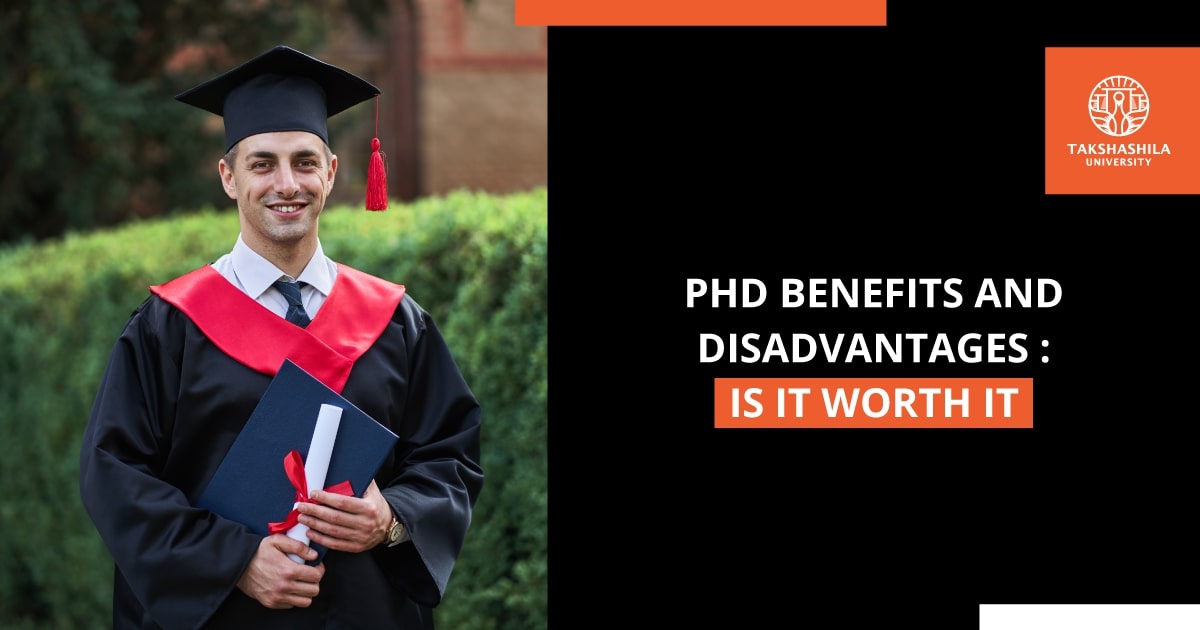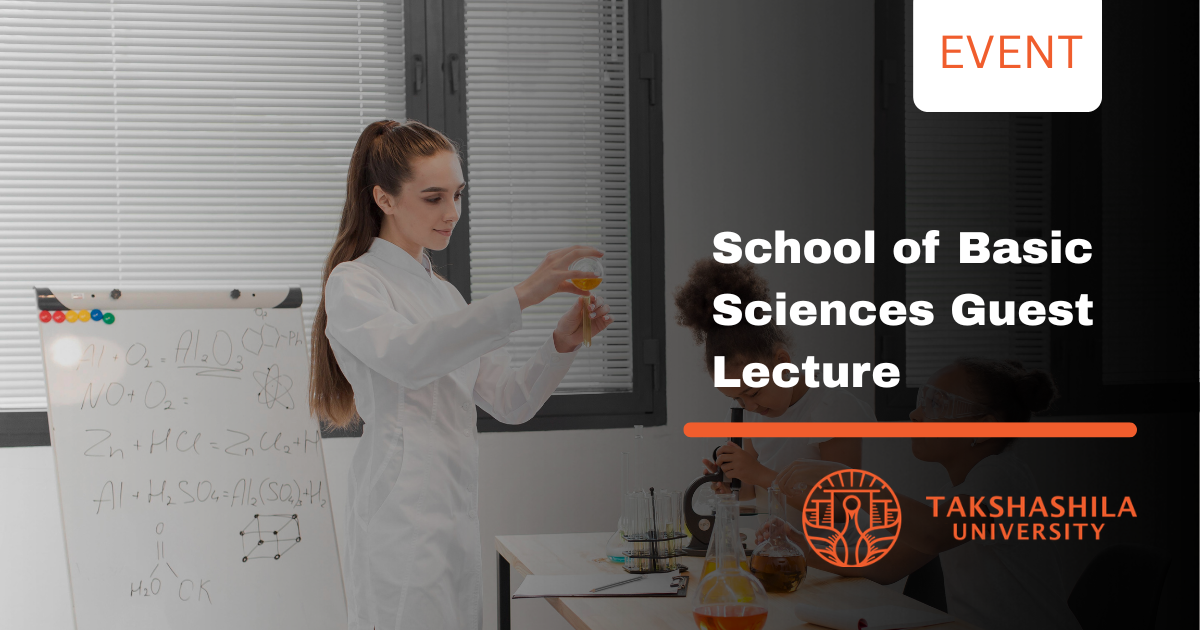Introduction
Takshashila University – A PhD is a prolonged journey and, as a result, involves total immersion in research, time, and personal sacrifice, which is why pursuing a PhD is a notable undertaking.
This is likely not your first thought about PhD benefits and disadvantages.
The purpose of this guide is to help you strategise on the merits of receiving a PhD and its drawbacks so that you can assess if it is the article is for you.
Now let’s get started !
PhD Benefits and Disadvantages Is it Worth it
PhD Benefits
1. PhD Benefits Oppression of bodies
A PhD is an expert credential that enhances one’s chosen area of concentration by exploring intricate theories, methodologies, and practices.
This deep specialisation makes you a thought leader who can create new knowledge or solve new problems.
Such knowledge stands in high regard both in the academic world and in the industries facilitating inventions, consultative works, and interaction with top experts across the globe.
2. Career Opportunities in Academia
In most cases, higher learning institutions require higher levels of education, preferably a PhD for research, teaching, or as an academic advisor.
These positions enable you to inform and guide students and conduct studies, thus enriching the body of knowledge.
For example, Publishing many studies with in-depth background knowledge and skills helps one look for funding opportunities and publish scientific papers without difficulty.
Yes, PhD positions are hard to get as there is a lot of competition; however, a PhD is one way to enhance one’s qualifications and gain access to higher education.
3. Higher Income
Although no one can promise gains proportional to the investment of time and energy devoted to the program, most PhD students earn higher incomes, particularly in fields such as engineering, science and healthcare.
Companies tend to pay these employees a fair amount as they regard those with a PhD as having acquired advanced knowledge and skills essential to the company.
In sectors such as pharmaceuticals, technology and academia, PhD graduates are more likely to receive better hiring salaries and higher promotions, having achieved greater earnings than those without the degrees.
4. Acquisition of Work-Related Skills
During the PhD program, one acquires various skills that assist in their chosen career.
Other skills, such as critical and analytical skills, project management and research skills, are also acquired. Increasingly, communication skills are learned, and one is trained to communicate complex matters with clarity and convincing argumentation.
This knowledge and experience are relevant to conducting research and working in consulting, policy, and many other places inside and outside academia, making you an excellent candidate who can fit into numerous sectors.
5. Contribution to Society
A PhD equips one to conduct original research which has the potential to impact society positively.
Whether it is a new way of treating diseases, advocating for the care of the environment, or addressing various social problems, your work has the potential to make a positive difference to humanity.
It is gratifying to see how a PhD caters to society.This provides immense job satisfaction, the practical application of one’s work, and the impact on the current and future researchers.
PhD Disadvantages
The downsides of obtaining a PhD are the following as well.
1. Time and Money Investment
To get a PhD, one will have to set aside a considerable amount of time, and it takes, on average, four to seven years to complete this degree.
Also, during the same period, you may have to take a considerable student loan and not be able to earn an income from full-time employment, etc.
In such a case, the elaborated financial burden can be pretty removed in some data grabs because, in the absence of these, you at least rely on grants or do part-time jobs to meet your education’s expenses. The time is also long,, so one is most likely to start work late in life.
which has disadvantages such as low earnings and lack of subjects for considering the economic status in the short run.
2. Security on the Job
Yes, a PhD qualification may broaden your possibility of getting employed. However it comes with some conditions. In this case, job security is not guaranteed, mainly in the education sector.
It is a common fact that to keep the hardcore members away, they come up with even more urgent ideas that entertain the PhDs whose sole probability of getting such edged is a meagre small number of permanent Censorship.
In addition, academic employment also comprises recurrent contractual positions and, therefore, do not bring much contentment since they are movable.
This eventuality is also the most stressful, given that one has spent years earning one’s degree, making it one of the PhD downsides you must consider.
3. Potential for Burnout
As stated earlier, a PhD program is very demanding, which can lead to burnout.
It takes a great deal of time to do the research, there is the tendency to publish a lot, and there are deadlines to meet. This is likely to wear down someone physically.
Most of the PhD students suffer stress that, in turn, leads to anxiety and tiredness, all of which compromise their health.
It is even more challenging to find time for activities other than academic work, which contributes to burnout, a significant PhD drawback that must be considered.
4. Impact on Personal Life
Accomplishing a PhD is highly time-consuming; it affects your personal life and relationships.
Regular lab, library, or fieldwork schedules often need to permit more time for family and friends and leisure.
Seclusion from these activities can result in isolation and irritation because it is hard to balance an everyday life.
The loss of relationships because of the PhD pursuit is a significant negative thing about the PhD.
5. Narrowed Career Options
While a PhD helps one to become an expert, it also tends to close your career options. Because of the focused nature of the PhD study, it is more probable that you will land jobs connected to your area of concentration only.
Further, such narrow specialisation can make switching to another sector or changing the career field difficult if one becomes more interested in something else.
At the same time, employers can consider a PhD holder too qualified for such a role that there would not be many job offers for the individual outside of the academic or research realm.
Visit the Takshashila Institution. It is worth a look at!
What is the worth of a PhD within the foreign university Takshashila? Do the wonders of earning a PhD impress you? At Takshashila University, we make it so.
Although obtaining a PhD is difficult, the pros, such as high knowledge, better job opportunities, and personal development, are a few, if any, shortcomings.
You have a supportive environment, help from experts, and exceptional connections in industries, all of which will prepare you for success.
Come to Takshashila University and witness then the usefulness of a PhD to the person. Apply now!
Conclusion
Pursuing a PhD is a rewarding but, at the same time, a daunting journey.
I hope that reviewing the PhD benefits and disadvantages in this article has assisted you in determining whether this approach is suitable for your other aspirations.
Contact mentors or educational institutions such as the Takshashila Institution if you still need clarification.






